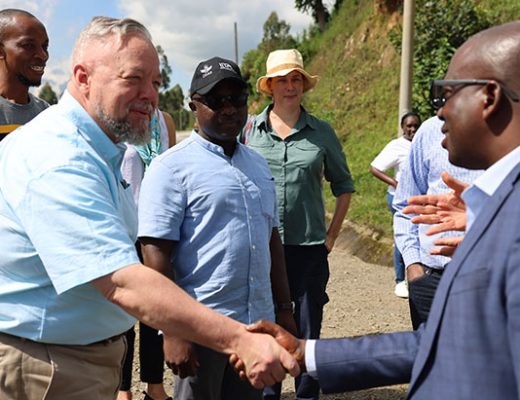|
Participants visiting a cassava multiplication site established by the FTF project |
On 14 July, IITA and partners working under the project Mitigating Cassava Disease Threats for Improved Cassava Production held a community-level forum with the traditional village heads and cassava growers from four districts in the Eastern Province of Zambia. The objective was to determine their most pressing challenges to cassava production as well as to work out action plans to address these problems. About 70 village Heads and farmers from Chipata, Petauke, Lundazi, Ketete, and Mambwe attended the forum; it was held at a participant’s farm in Chipata.
The project is one of the six components of the Zambia Feed-the-Future Research and Development Program, which is funded by USAID and coordinated by IITA.
“The idea of the forum is to identify problems in cassava production from the perspective of the local farmers,” said Dr Pheneas Ntawuruhunga, cassava breeder and leader of the project. “We involved the traditional village chiefs because they are a vital social node for farm-related information besides the fact that they are held in the highest esteem by members of their communities. This will help to ensure that whatever agreements or action plans are developed in the forum will be followed up.”
Through participatory focus group discussions, the village chiefs and farmers highlighted common challenges to cassava production in their communities. These were a lack of good seeds/planting materials, prevalence of diseases attacking the crop, a lack of market for their produce, and the low numbers engaged in cassava production. In addition, they said that domestic animals/livestock and elephants were eating their cassava; bush fires were damaging cassava stands; cassava roots were being stolen, and there is a lack of training and information on good cultural practices, among others.
“From a research standpoint, we are aware of some of these issues which the project is already addressing. Through this local engagement, we are also able to verify from the farmers themselves that these are indeed their main challenges, and even the proposed solutions can come from them,” added Dr Ntawuruhunga. “Such engagement enables farmers to have a sense of ownership of the project.”
During the forum, farmer-participants came up with action plans to address the challenges they had identified. Some of the solutions proposed included project farmers taking the responsibility for sharing knowledge and information on good cultural practices with their fellow farmers; by-laws should be passed by the village chiefs penalizing owners of free-roaming livestock that damage other farmers’ crop; cassava growers should make sure that appropriate fire breaks are integrated in their fields to minimize or avoid bush fire damage; neighbourhood watches should be established or strengthened to deter theft; ropes dipped in chili should be used to fence off the cassava fields from elephants.
“But, of course, the project is here to provide farmers with the research support and backstopping they need to improve their cassava production,” said Mr Kennedy Kanenga, the Acting Provincial Agricultural Coordinator for the Eastern Province and Director of the Zambia Agriculture Research Institute’s (ZARI) Msekera Research Station.
“For example, through the project, ZARI and IITA can provide farmers with good quality planting materials that are well adapted, high yielding, disease resistant, and with the qualities that end users prefer. We will also help them to identify markets for their produce, as well as deliver training on modern cultural practices. These are just some of the interventions that we can make based on the needs the farmers have identified in this forum,” Mr Kanenga added.
The stakeholders’ forum also gave the project researchers the opportunity to clarify some misconceptions raised by farmers, such as the belief that cassava can cause blindness and that regularly eating cassava causes goiter.
“This exercise has enabled us to get a feel of the pulse of the communities – to see the situation through the eyes of the farmers,” Dr Ntawuruhunga emphasized. “This is something that IITA will be doing for our other projects as well, to make our research results even more relevant to our intended beneficiaries.”
“It is now up to them [village chiefs and farmers] who are present here to follow through with the action plans that they developed. The donor [USAID] wants to see solutions coming from the farmers themselves and an increase in the number of farmers getting into cassava production in Zambia. Of course, IITA and our partners in this project will continue to support them in whatever way we can,” he concluded.


No Comments